[Study Abroad Experience] From Nurse to Cebu, and Back to Australia Again

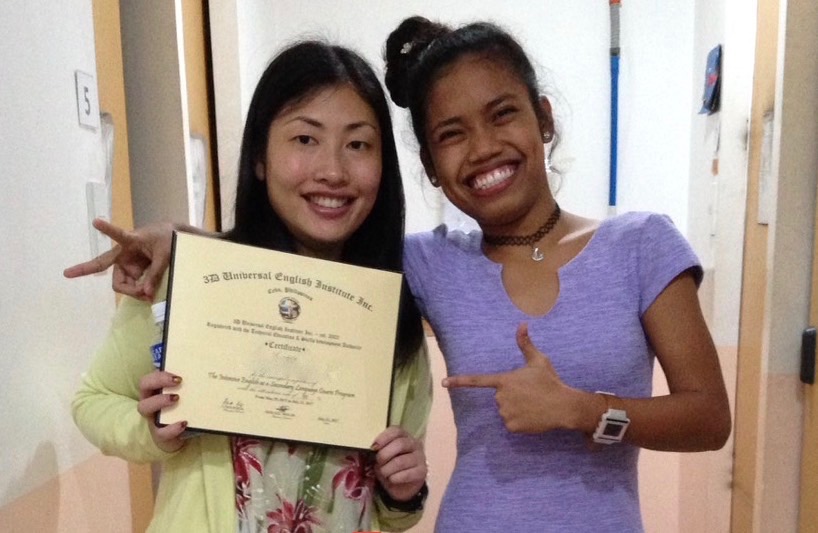
Contents
- [Study Abroad Experience] From Nurse to Cebu, and Back to Australia Again
- Chapter 1: Life as a Nurse and the Spark of a Dream Abroad
- Chapter 2: At 27, She Took the Leap—A Challenge in Australia
- Chapter 3: Earning a Caregiver Certification and the Frustration of Language Barriers
- Chapter 4: Daily Life at 3D ACADEMY — A Commitment to Start Over and the Teachers Who Made It Possible
- Chapter 5: A Disciplined Study Routine and the Motivation Sparked by Fellow Learners
- Chapter 6: Looking Ahead — From Cebu, Back to Australia Again
- Chapter 7: A Message from Lino — To Those Considering Studying Abroad
[Study Abroad Experience] From Nurse to Cebu, and Back to Australia Again
Lino’s Story: An 8-Week Journey of Redemption Born from Regret
Leaving the hospital behind for a new chapter abroad—
It’s easy to say, “I’ll quit my job and go overseas,” but taking that first step takes real courage.
This is the story of Lino, who spent 8 weeks studying English at 3D ACADEMY in Cebu. After graduating from high school, she began her career as a nurse. Later, she took on a working holiday in Australia. However, it wasn’t until she faced her own limitations that she decided to seriously confront her English ability—and give herself a second chance by studying in the Philippines.
What pushed her to study abroad in Cebu?
It was the deep regret she felt during her time in Australia.
Despite confidently declaring to her friends, “I’ll come back speaking English,” the reality didn’t match.
Unable to speak the way she had hoped, Lino made a firm decision:
This time, I’ll do it right.
She chose 3D ACADEMY and dedicated herself to intensive study.
In this article, we’ll take a deep dive into Lino’s journey—divided into seven chapters—including her classes, learning methods, how she spent her free time, and her hopes for the future.
Whether you’re considering studying abroad, planning a working holiday, or are a healthcare professional looking to take your skills overseas, Lino’s honest and inspiring experience will surely resonate with you.
“There’s always meaning in a study abroad experience—if you truly give it your all.”
Through Lino’s story, we hope you feel the weight and truth of those words.

Chapter 1: Life as a Nurse and the Spark of a Dream Abroad
“I told myself I’d stick it out for three years—but deep down, I wanted to quit every single day.”
Lino began working as a nurse shortly after graduating from nursing school following high school. It was a job filled with responsibility—after all, she was entrusted with people’s lives. Though she found meaning in the work, the reality was far tougher than she had imagined. The relentless pressure from senior staff, exhausting night shifts, and the emotional weight of dealing with life-and-death situations took a toll on her mental and physical well-being. There were many times when she wanted to walk away.
Still, Lino pushed herself to continue, telling herself, “Just three years, no matter what.”
She feared that if she quit early, she would internalize the idea that she was running away just because it was hard—and that this pattern might repeat in her future workplaces. She endured each day with that mindset, refusing to give up easily.
But after three years, the situation changed again. She was assigned to train new nurses, becoming someone others looked up to. The sense of duty grew heavier, making it even harder to leave—even though her heart still longed to.
Then came a turning point: her very first overseas trip.
Invited by a friend, Lino agreed to the trip casually. But for her, it became a life-altering experience.
Her travel companion spoke fluent English and comfortably interacted with locals. Watching her friend navigate the world with confidence, Lino thought, “Wow… speaking English is so cool.”
Around the same time, a former classmate from nursing school went on a working holiday to Australia. Seeing her friend’s cheerful posts about life abroad—so different from her own—ignited a flame in Lino: “I want to live overseas someday.”
That longing stayed with her. Even as she continued nursing, thoughts of “living abroad” and “learning to speak English” remained tucked in the back of her mind. But quitting her job wasn’t easy, and the daily demands of hospital life kept her dreams on hold.
It wasn’t until she turned 27 that Lino finally took action.
A friend’s decision to quit her job inspired Lino to do the same.
“If I don’t do it now, I might never do it.”
She left her job and took a resort part-time job in Okinawa to save money, all while preparing for her next big step: a working holiday in Australia.
Chapter 2: At 27, She Took the Leap—A Challenge in Australia
“Not ‘someday’—I’ll go now.”
With that decision, 27-year-old Lino left the hospital she had worked at for years. Giving up a stable career in nursing was scary, of course. But letting go of her long-held dream to go abroad felt even scarier.
After quitting, she took a live-in job at a seaside resort in Okinawa, spending a few quiet months reflecting and saving up. Then, at last, she set off for Australia on a working holiday.
“I’m going to come back speaking English. Just watch.”
She confidently told her friends before leaving.
In the first few weeks, she attended language school and studied with classmates from all over the world. But at first, she struggled with conversations in English and found it hard to build confidence.
Next came the grueling work at a rural farm, a requirement to extend her visa. Picking fruit, packing, and starting early every day—it was a far cry from learning English, and slowly, doubt began to creep in.
After earning her visa extension, she returned to the city and began working as a cleaner. There, she met others who were chasing professional goals—aspiring nurses, lab technicians, and certified caregivers. Surrounded by these driven people, she began to ask herself:
“Why did I even come to Australia?”
She was working every day, hardly traveling, and watching time slip by.
It was then that Lino paused and reflected on what she really wanted.
She still loved nursing.
But if she was going to pursue it abroad, she needed a clear goal.
That’s when she heard about caregiving—a profession in demand in Australia, offering opportunities and respect. With her nursing background, it felt like a natural next step. Lino decided: “This is it.”
She enrolled in a school to get certified as a caregiver and also earned a First Aid certificate. Though the classes were heavy with technical English, her real-world experience helped her understand and stay engaged.
Still, one thing hadn’t changed: her English wasn’t improving the way she’d hoped.
“I thought I’d be fluent by now.”
“This isn’t what I imagined.”
Before coming to Australia, she had boasted to friends that she’d return fluent. But in reality, she often couldn’t express herself. Struggling in conversations left her feeling embarrassed—and that embarrassment slowly turned into frustration.
“There’s no way I’m going home like this.”
Around that time, many of her Japanese friends and coworkers recommended studying in Cebu, Philippines.
“You’ll improve fast there.”
“It’s great for speaking practice.”
The more she heard, the more she realized—this might be the fresh start she needed.
“I’ll give myself one more chance.”
And so, Lino made a bold decision: to pause her life in Australia and head to Cebu for an intensive English study program.
Chapter 3: Earning a Caregiver Certification and the Frustration of Language Barriers

Just as her life in Australia was beginning to settle into a rhythm,
Lino made the decision to pursue formal qualifications: a Caregiver Certification and First Aid Certification from a local school.
“Because of my background as a nurse, the content itself was manageable. But studying all of it in English—that was a real challenge.”
The classes covered a wide range of topics including elderly care techniques, caregiving ethics, and medical procedures. Of course, everything was taught in English. Medical and technical terminology filled the air, and Lino found herself constantly flipping between textbooks and dictionaries just to keep up.
The course also included practical training in elderly care facilities, where she had to communicate with Australian seniors in English while providing hands-on care. But there were many moments when she couldn’t understand what they were saying—or worse, couldn’t make herself understood.
“Just the fact that we didn’t share a language made it harder to build trust. And what pained me the most was thinking that I might be making them feel uneasy.”
As a nurse, she was used to comforting patients—helping them feel safe and understood.
But now, the language barrier stood in the way of that mission.
This emotional disconnect became a constant source of frustration.
Even so, Lino kept pushing forward, determined to earn her certifications.
The caregiving knowledge and hands-on experience she gained in Australia became invaluable steps toward her larger dream of working in healthcare abroad.
And yet—
there was one lingering emotion she couldn’t shake: the frustration of not being able to speak English fluently.
“Before leaving Japan, I honestly thought I’d just pick up English naturally once I got overseas. But it didn’t happen. Not being able to express myself—it was frustrating and discouraging.”
Many of the Japanese friends she met during her working holiday had studied English in Cebu, Philippines, before coming to Australia.
And Lino could tell immediately—their English skills were clearly stronger.
“So many of them would say, ‘I’m only able to do this now because I studied in Cebu.’ And their English just flowed so naturally. It made me jealous. It made me want to try it too.”
She began to feel a strong desire to start over with English.
This time, she wanted to come home and say with confidence, “I can really speak English now.”
With that growing determination, Lino decided to pause her life in Australia and look for an environment where she could focus fully on language learning.
Her choice?
A language school in Cebu, Philippines—a destination highly recommended by her friends.
Among the many options, one school stood out: 3D ACADEMY, where two of her most trusted friends had studied and achieved great results.
“You can take native-speaker classes. You get tons of speaking practice in just a short time. Plus, I already had friends in Cebu, so I felt safe going there. I just thought—this is it.”
And so, Lino signed up for an 8-week language course in Cebu.
A new chapter in her journey was about to begin—
a second chance, built on frustration, courage, and hope.
Chapter 4: Daily Life at 3D ACADEMY — A Commitment to Start Over and the Teachers Who Made It Possible
To seriously confront her English once and for all, Lino chose the Philippines—and specifically, Cebu Island.
Among the many options, the school she selected was 3D ACADEMY. What made the difference? Two Japanese friends she had met in Australia were graduates of the school, and both spoke highly of their experience.
“My friends recommended it with such confidence. Hearing it directly from people I trust—that gave me the strongest reassurance.”
Lino enrolled in the ESL course, which focused on speaking, for a total of 8 weeks.
As is common in the Philippines, the curriculum emphasized one-on-one lessons, meaning she spent several hours every day speaking directly with teachers in English. It was full immersion.
Lively Lessons That Kept Her Awake — Meeting Tyler, the American Teacher
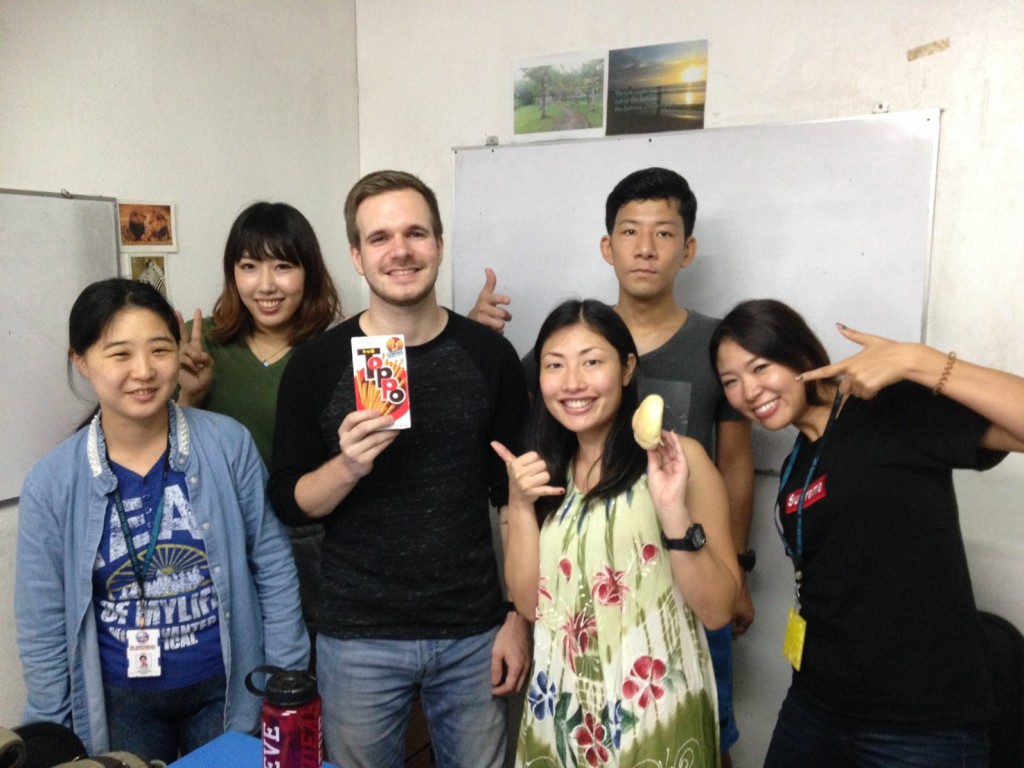
One of the most memorable teachers for Lino was Tyler, a native English-speaking instructor from the U.S. He taught classes for beginner-level students and made sure his lessons were never boring.
Rather than just memorizing vocabulary or grammar, Tyler incorporated games and interactive activities that made English fun and engaging.
“His class was right after lunch—the time when you just want to nap! But with all the games and laughter, it became something I actually looked forward to. That was the moment my image of English learning totally changed.”
Tyler also taught idioms and slang commonly used by native speakers—phrases Lino had never seen in textbooks. More importantly, he explained how and when to use them naturally.
“Even if you think you know an idiom, it’s easy to use it the wrong way. Tyler was great at explaining those subtle differences clearly.”
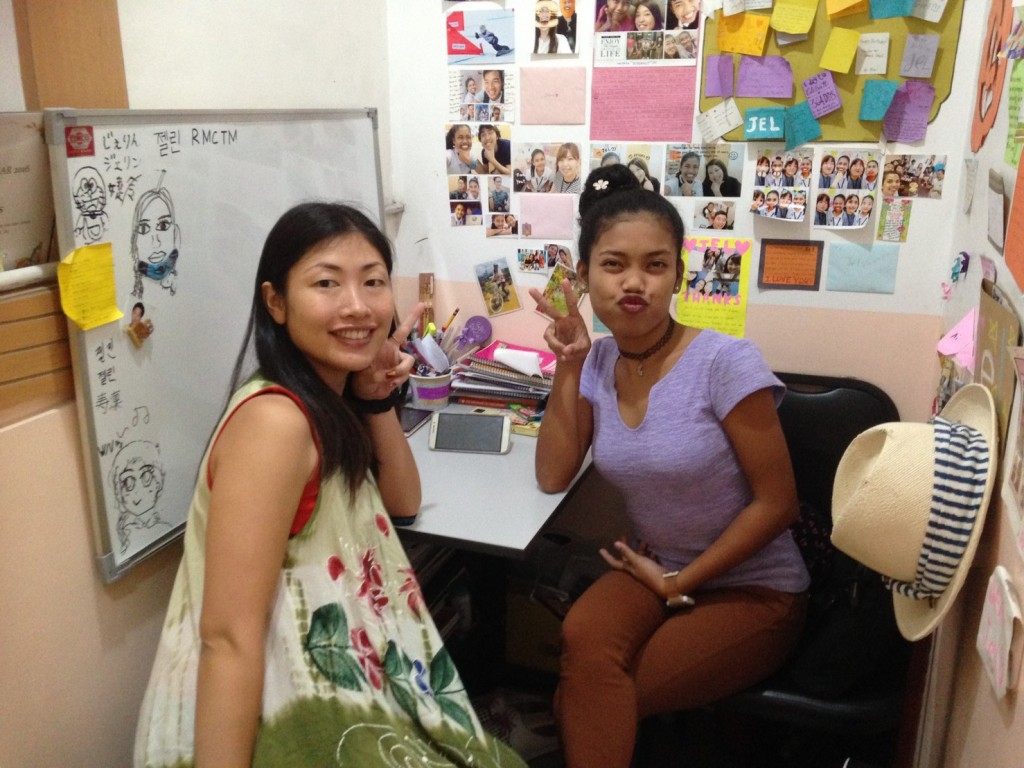
Building Study Habits Naturally — Jel’s Grammar Lessons
Another teacher who left a strong impression on Lino was Jel, who taught grammar-based classes.
Her teaching style was extremely clear, with easy-to-understand examples and practical real-life situations. It helped the material stick in Lino’s memory.
Each class began with a review of the previous day’s lesson. For example, if they learned ten new adjectives, students were expected to come back the next day with original sentences using those words—without looking at notes.
“Trying to recall everything from memory and speak it aloud—it was so hard! But it was honestly great. That pressure to keep up gave me a routine. Before I knew it, I had built a daily study habit.”
Because of Jel’s style, the class didn’t end when the lesson ended. It extended into homework and real-life usage, helping Lino internalize what she learned by putting it into her own words.
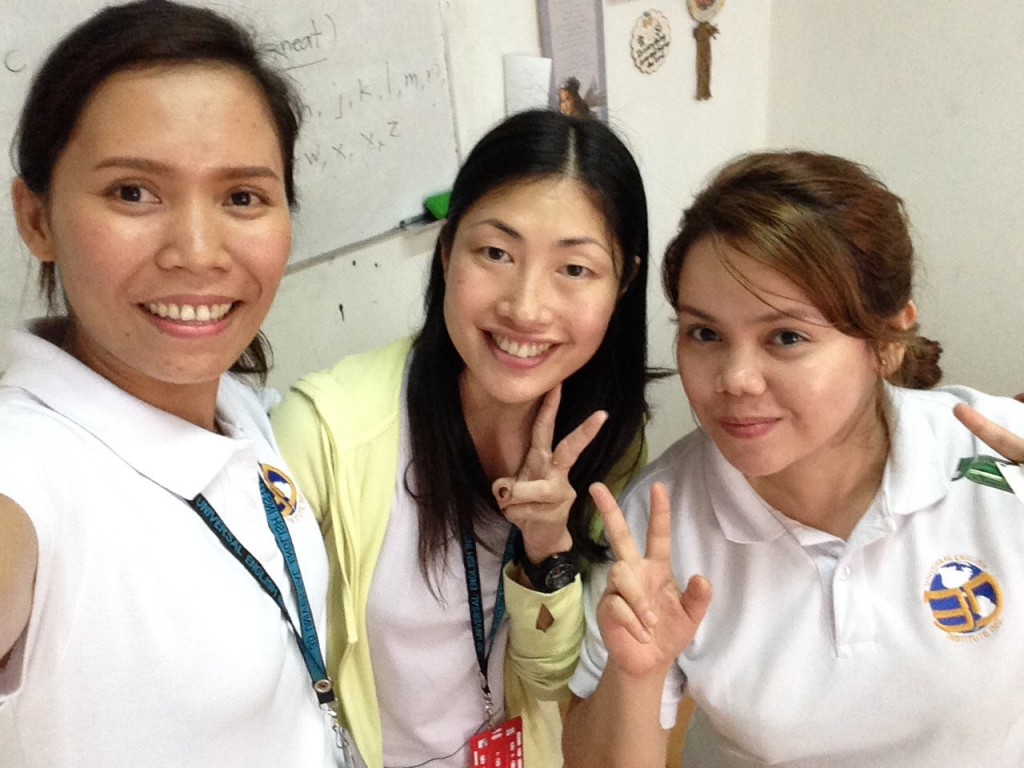
The Class That Helped Her Improve the Most — Daisy’s Pronunciation Masterclass
Above all, the teacher who impacted Lino the most was Daisy, who specialized in pronunciation.
“Pronunciation had always been my weak point. I’d try to speak English, but people wouldn’t understand me. The worst part? I didn’t even know what I was doing wrong.”
For someone carrying that burden, Daisy’s classes were a game changer.
She taught the entire phonetic alphabet, focusing not just on words but on sound production—how to position your mouth, lips, tongue, and vocal cords.
“We even had exercises where Daisy would say a sound, and we’d write it down using phonetic symbols. It felt more like music listening than a language class. Now when I look at a dictionary, I can instantly figure out how to pronounce the word.”
Through this class, Lino learned a powerful truth:
“Change your pronunciation, and you change how you’re understood.”
For the first time, she experienced the joy—and the confidence—of having her English understood clearly.
Classes ended each day at 4:00 PM.
But for Lino, her day didn’t stop there.
In the next chapter, we’ll explore how she spent her evenings and weekends, the strategies she used to maintain her motivation, and how she turned this study abroad experience into a personal success story.
Chapter 5: A Disciplined Study Routine and the Motivation Sparked by Fellow Learners
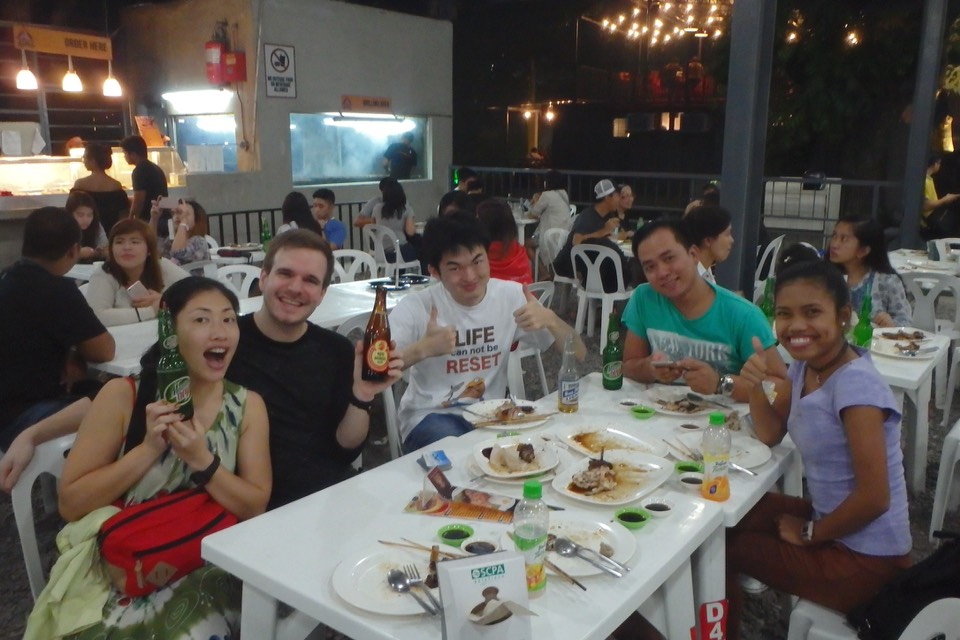
Classes at 3D ACADEMY ended each day at 4:00 PM.
But for Lino, that was when her real day began.
In the first week, she spent her time observing how other students used their evenings. But soon enough, she found her own rhythm and routine.
“After class, I’d eat dinner at the school restaurant and stay there to do my homework and review the lessons. Back at the hotel, I tried to keep myself immersed in English as much as possible.”
Most of her friends at school were also serious about studying.
Their dedication naturally fueled Lino’s own motivation.
“Even if people say I’m studying too much, I’ll keep going.”
On weekends, she would occasionally post on social media—photos of meals with friends or a trip to the mall. But those harmless updates sometimes triggered unexpected reactions.
“Some friends back home messaged me like, ‘Wait… I thought you went abroad to study? Aren’t you just playing around?’”
Even casual outings could be perceived as “just having fun” by others.
That misunderstanding stung a little. After all, to Lino, these outings were part of using English in real-world settings.
In response, she adjusted her weekend schedule—one day for going out, the other for full-on study.
And that pattern stuck.
Enjoying life abroad isn’t wrong. But she knew she had a clear purpose.
And that purpose kept her grounded throughout her short but intense 8-week stay.
“Because it was my second time studying abroad, I couldn’t afford to waste it.”
This wasn’t Lino’s first attempt at language study.
Her first experience in Australia left her with a deep sense of frustration. She hadn’t become the English speaker she wanted to be.
“I didn’t want a repeat of that. There was no way I was going to leave this time without growth.”
Because of that, Lino held herself to high standards.
She admits she’s not someone who picks things up quickly—so she worked with the mindset that she had to put in twice the effort to see results.
Turning Break Time into English Time — Making Daily Life a Learning Space
Of course, she also understood the importance of rest.
Sitting at a desk for hours on end could lead to burnout, so Lino made sure to include “relaxing English study” in her routine.
-
Writing journal entries in English at a café
-
Watching English YouTube channels for listening practice
-
Watching English movies without subtitles
-
Chatting with school friends under a “no Japanese” rule
“If you treat English like a burden, it becomes exhausting. So I tried to sprinkle in fun English activities throughout the day to keep it balanced.”
What Pushed Her Forward Most: The People Around Her
One of the biggest motivators during her time at 3D ACADEMY was the diverse community of students.
She studied alongside people from Japan, Taiwan, Korea, Vietnam, Saudi Arabia, and many other countries. Since they didn’t share a common language, English was the only way to communicate.
Even if their grammar or pronunciation wasn’t perfect, everyone was trying to communicate.
That effort inspired Lino deeply.
“There were so many people who just spoke without fear—even if their English wasn’t perfect. That gave me courage. I realized it’s okay to make mistakes—as long as I keep speaking, I’ll improve. And slowly, I started feeling less scared to speak.”
Eight weeks of focused study.
Behind it all were feelings of regret, a commitment to change, and a determination to stop running away from her challenges.
In the next chapter, we’ll explore where Lino is headed next—and how her time in Cebu shaped the direction of her life moving forward.
Chapter 6: Looking Ahead — From Cebu, Back to Australia Again
After completing her 8-week language study program in Cebu,
Lino walked away not only with improved English skills but also with a strong sense of self-confidence.
“I finally started to feel less anxious about speaking English. It no longer scared me. I realized that even my English—flawed and imperfect—can still get my message across. That shift meant everything.”
Reflecting on her two study abroad experiences, Lino realized a major difference:
In her first time in Australia, she had only “been around” English.
But in Cebu, she directly faced the challenge of “speaking” English every single day.
That shift in mindset became the key to her growth.
The Moment She Felt: “I Can Actually Speak Now”
It wasn’t just about being able to express her opinions in English.
The emotional barrier—the fear of speaking—had clearly diminished.
Her days in Cebu weren’t just about “improving language skills.”
They were about gaining the confidence and ability to live in English.
Shopping, dining, going out on weekends, casual chats with friends—
Every activity became a chance to practice.
Every moment turned into meaningful preparation for her future.
Her Next Goal: Returning to Australia—For Real This Time
After the program, Lino now has a clear goal in mind:
To return to Australia and begin a full-fledged career as a caregiver.
“My background as a nurse, the caregiver certification I earned, and the English skills I developed during this course—they finally feel connected, like they’re part of a bigger picture.”
There was once a time in Australia when she asked herself,
“What am I even doing here?”
Now, with clear purpose and direction, she feels like a completely different person.
To her, the 8 weeks at 3D ACADEMY were about “reclaiming who I truly am.”
“Being able to speak English doesn’t make you special. But it absolutely expands what you’re capable of doing. I’m genuinely glad I made the decision to come to Cebu.”
A New Challenge: Considering an Internship in Cebu
Lino is now also considering another exciting possibility—
Returning to Cebu to take on an internship at the very same language school that helped her grow.
“I want to continue improving my English, but also gain work experience in the field. If I can become someone who encourages others to take the leap, that would be incredibly meaningful.”
She’s walked the path as a student. She’s felt the highs and lows.
Now, she’s ready to support others on the same journey.
Lino’s learning is no longer just for herself.
It’s gradually transforming into something she can pass on—to uplift and guide others.
Chapter 7: A Message from Lino — To Those Considering Studying Abroad
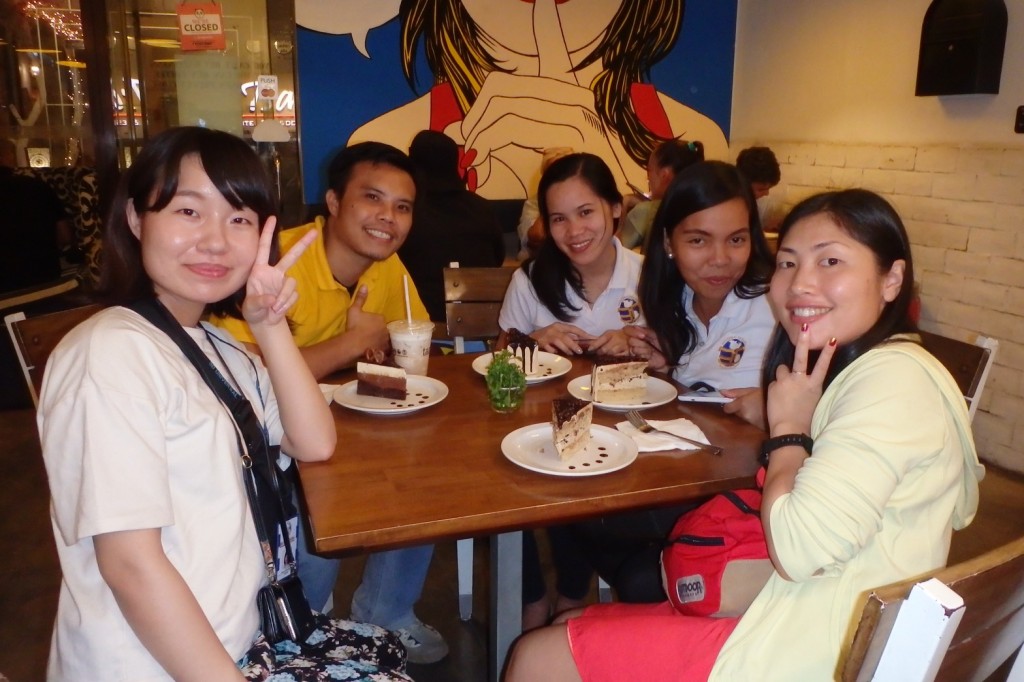
After completing her 8-week language program in Cebu,
Lino shared a number of insights and practical tips based on her own experiences.
For anyone thinking about studying abroad, feeling insecure about their English, or unsure about their potential—her words will surely resonate.
1. Preparation Before Studying Abroad Makes All the Difference — Even Just Basic Junior High English Is Enough
“Just mastering one vocabulary book and junior high school grammar can drastically change how much you understand in class!”
This was something Lino emphasized strongly, especially because she deeply regretted being underprepared when she first went to Australia.
Since most classes in Cebu are designed to improve speaking, your ability to understand basic vocabulary and grammar directly affects how much you can absorb.
“If you don’t know the words, your brain spends the whole class just trying to translate. Even if the teacher is doing their best to teach, you can’t really enjoy the lesson.”
That’s why Lino highly recommends doing at least one full round of review before leaving—even if it’s not perfect.
2. When You’re Mentally Exhausted, Don’t Hesitate to Take a Break
“The first week, just constantly using English made my head feel completely overloaded!”
This is a common experience for many language learners, and Lino was no exception.
Before your “English brain” kicks in, even basic communication in a foreign language can be surprisingly draining.
“If you feel like you’re not cut out for English—don’t worry. Everyone feels like that at first.”
In times like these, Lino advises not to push yourself too hard.
Instead, allow yourself to rest and find healthy ways to reset.
Whether it’s listening to music, grabbing a coffee, or watching a movie—taking a small break from English can actually help you stay motivated long-term.
3. Keep Your Own Pace — Don’t Compare, Don’t Rush, Just Stay Steady
“The most important thing is not comparing yourself to others.”
Among the students Lino met in Cebu, there were fluent speakers and total beginners, people of all ages and from all over the world.
But everyone had their own learning journey and their own pace.
“I’ve never been a quick learner, so I focused on steady, daily progress. Even just remembering one new phrase a day—I made sure to praise myself for that.”
During study abroad, you’ll likely face moments of doubt or lose confidence.
But that’s when you need to stay grounded.
If you keep building small steps, one by one, you’ll eventually see big changes.
This is the “growth formula” Lino learned from experience.
In Closing: Your Study Abroad Journey Will Have Meaning
“I used to think there were two types of students—those who succeeded in studying abroad and those who didn’t. But now I know: if you give it your all, your experience will always have meaning.”
Lino didn’t get the results she hoped for during her first time abroad.
But through her second challenge, she finally became someone who could proudly say, “I learned to speak English.”
It wasn’t about outperforming others. It was about confronting and overcoming her own limitations.
“The person I became by pushing myself—that’s what I’m most proud of.”
Her words are a powerful message to anyone who doesn’t want their study abroad to be “just an experience.”
Lino’s journey proves that with effort, intention, and perseverance, studying abroad can become a turning point in your life.
Read this story in Japanese:
【留学体験記】看護師からセブ島へ、そして再びオーストラリアへ




